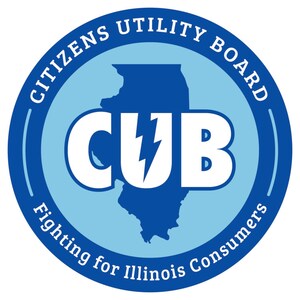CHICAGO, Feb. 10, 2020 /PRNewswire/ -- Electric Vehicle drivers in Central and Southern Illinois could potentially save hundreds of dollars a year in charging costs if they participate in an Ameren Illinois program called Power Smart Pricing, according to a new study released by the nonprofit consumer watchdog Citizens Utility Board (CUB) Monday.
"Charge for Less: An Analysis of Electricity Pricing for Electric Vehicles in Ameren Territory" can be found at CUBHelpCenter.com. It was written by CUB Data Scientist Ramandeep Makhija, Research Director Jeff Zethmayr and Executive Director David Kolata.
The study found that Ameren's Power Smart Pricing program, a special electricity plan available to residential customers, could have helped electric vehicle (EV) drivers reduce the annual cost for charging their vehicles by 86 percent to 88 percent, compared with what they would have paid under Ameren's traditional electric prices. The potential savings ranged from $54 to $379 over the year studied, 2018.
Unlike Ameren's standard power price, which changes infrequently, Power Smart Pricing charges a market-based price that can change hourly. Those prices often plummet during "off-peak" times (typically nights and weekends) when electricity demand is low, giving customers the chance to save money on their electric bills.
By encouraging drivers to charge their cars when electricity demand is low, Power Smart Pricing not only saves participants money, but it also puts less stress on the power grid, improving reliability and reducing pollution.
"Power Smart Pricing is a great choice for a lot of Ameren customers—because the program is good for the planet and our pocketbooks—but it is especially beneficial for EV drivers," said CUB Executive Director David Kolata, an EV driver himself. "Illinois urgently needs to develop smart charging policies that promote programs like Power Smart Pricing to prevent our costs from going up as more and more EVs hit Illinois roadways."
The Edison Electric Institute predicts that EV sales will rise sharply over the next decade, leading to nearly 19 million in the U.S. by 2030, up from about 1.5 million now. If not properly managed, this influx could significantly increase overall U.S. peak electricity demand and force everyone to pay higher power bills to cover a costly expansion of power plants and the grid. But this is preventable with good policies. In fact, CUB studies show that optimization—charging EVs at the right times—would lower electricity rates for all consumers.
CUB's report comes as EVs are generating news in Central and Southern Illinois. In Normal, Rivian is giving new life to a shuttered Mitsubishi factory, transforming it into an EV manufacturing plant that will employ as many as 1,000 workers. Meanwhile, in Springfield, Gov. J.B. Pritzker has called for clean energy legislation that "accelerates electrification of our transportation sector."
CUB is currently advocating for the General Assembly to pass the Clean Energy Jobs Act (CEJA), the most consumer-friendly energy bill in Springfield. It includes a "beneficial electrification" provision that would encourage people to charge their EVs at off-peak times, using programs like Power Smart Pricing.
Power Smart Pricing is open to all Ameren customers, not just those with EVs. Participants save money by adjusting the time of day when they perform major tasks like operating the dishwasher, doing laundry, or charging an EV. In fact, Power Smart Pricing customers have saved an average of about 15 percent on the supply portion of their power bills.
Programs like Power Smart Pricing help decrease electricity demand at "peak times." This eases stress on the grid, helping to prevent costly power outages. It also avoids the need to fire up expensive "peaker" power plants, cutting pollution and lowering electricity costs for everyone.
CUB's study put Power Smart Pricing to the test, comparing what EV drivers would pay on the program versus the utility's flat-rate energy price. The study estimated the savings for drivers of three popular EVs: the 2018 Toyota Prius Prime, the 2018 Chevy Bolt, and the Tesla 3 Long-Range using Level 2 and Level 3 DC fast charging. CUB used four typical daily driving amounts: 15 miles (light driver); 30 miles (average driver); 50 miles (heavy driver); and 100 miles (ride share driver).
Kolata is a customer of Hourly Pricing, a ComEd program similar to Power Smart Pricing, but for Northern Illinois consumers. He said a similar CUB study for ComEd territory found potential savings of at least 52 percent on energy costs, which is in line with how much he has saved.
"Electricity customers are hungry for good choices in the market, and Power Smart Pricing is one of the best, whether you drive an EV or not," Kolata said. "We hope lawmakers in Springfield pass the Clean Energy Jobs Act to make sure the grid is prepared for the rise of EVs but also to connect EV drivers to good programs like Power Smart Pricing."
Ameren customers interested in exploring whether they are a good fit for Power Smart Pricing should visit PowerSmartPricing.com or call 1-877-655-6028.
CUB is Illinois' leading nonprofit utility watchdog. Created by the Illinois Legislature, CUB opened its doors in 1984 to represent the interests of residential and small-business utility customers. Since then, it has saved consumers more than $20 billion by helping block rate hikes, secure refunds, and fight for clean, low-cost energy. For more information, call CUB's Consumer Hotline, 1-800-669-5556, or visit its award-winning website, www.CitizensUtilityBoard.org.
SOURCE Citizens Utility Board

Related Links
http://www.citizensutilityboard.org
WANT YOUR COMPANY'S NEWS FEATURED ON PRNEWSWIRE.COM?
Newsrooms &
Influencers
Digital Media
Outlets
Journalists
Opted In





Share this article